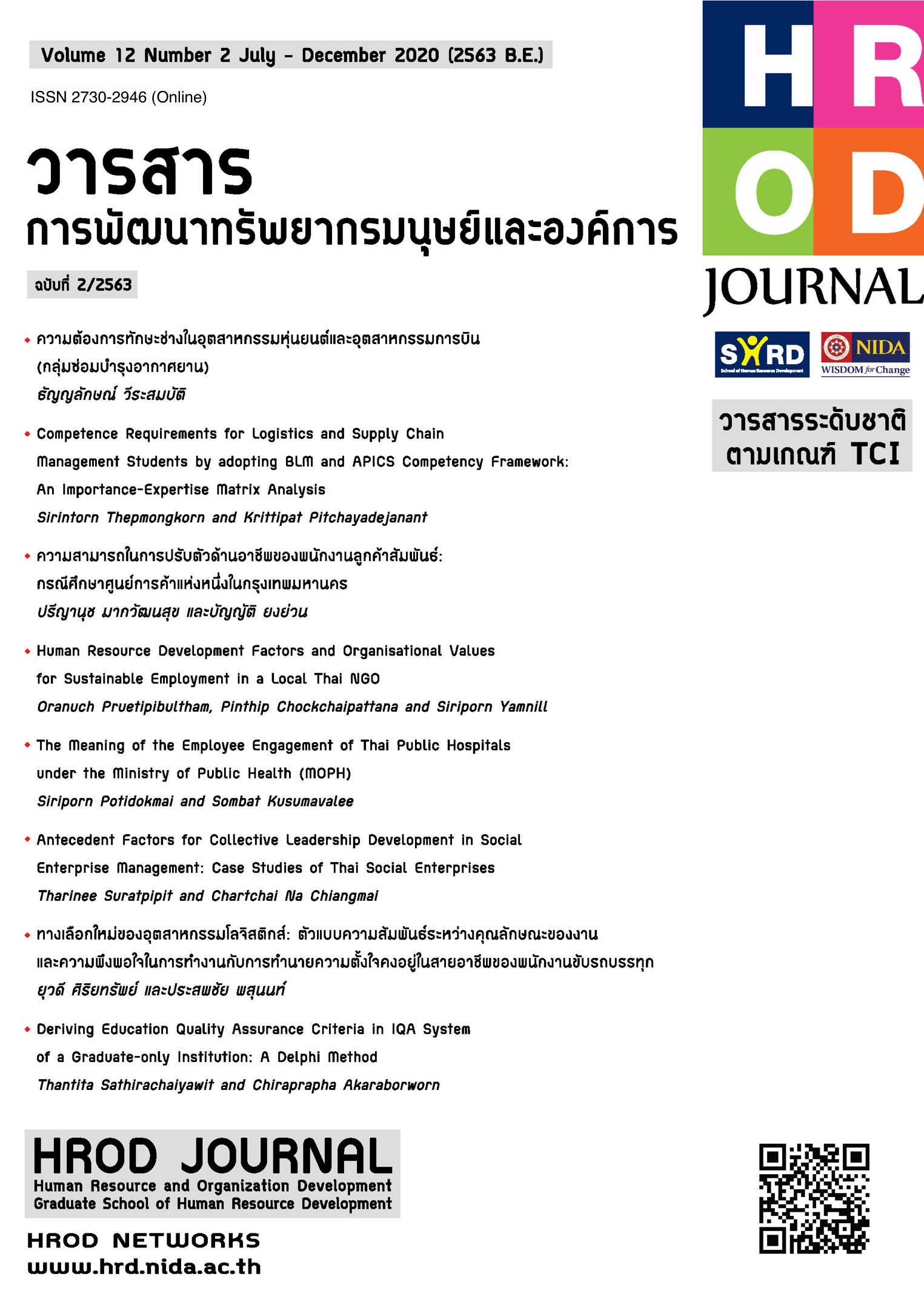Deriving Education Quality Assurance Criteria in IQA System of a Graduate-only Institution: A Delphi Method
Main Article Content
Abstract
The latest internal quality assurance (IQA) system developed by the Office of the Higher Education Commission (OHEC) gives an opportunity to each institution to select its own IQA system in order to manage education to be efficient and effective on an ongoing basis. Therefore, the institution needs to study related principle carefully to select suitable IQA system as it is one tool of organization development to achieve its goal. The purpose of this paper was to demonstrate a method of deriving quality assurance (QA) criteria for a graduate-only institution adopting the National Institute of Development Administration (NIDA) as a case study. The method applied here was the Delphi method. A Questionnaire for the Delphi was developed from a revision of QA frameworks, both national and international levels including the results of focus group and interviews. 35 subject matter experts (SMEs) were purposively selected from persons having responsibilities related to the IQA system at NIDA. Mode, Median, and Interquartile were used for data analysis. The study found 7 items with perfect consensus: 4 items in management section were under human resource management, and working systems topics, 2 items in teaching section were under program, and student development and support topics, including 1 item in academic service section. From the process of implementing the Delphi, it can be recognized as observation for future research that the QA frameworks for developing the questionnaire and the qualification of the SMEs are significant.
Article Details
1) The content of article in HROD journal is the author’s wholly responsibility to research, analyze, summarize, compile, and reference data. The editorial department will not be responsible in anyway.
2) The submitted articles in HROD journal must be unpublished before and must not be currently under consideration for publication elsewhere. If it is detected for its repetition, the author must be responsible for infringement of copyright.
3) Authors will be asked to transfer copyright of the article to the Publisher. The article is prohibited to reproduce all or part of the text, unless allowed.
References
References
ASEAN University Network Quality-Assurance. (2007). Manual for the implementation of the Guidelines. Retrieved on December 15, 2018, from http://www.aunsec.org/pdf/aunwebsite/02_AUNQAImplementationManual.pdf
Avella, J. (2016). Delphi panels: Research design, procedures, advantages, and challenges. International Journal of Doctoral Studies, 11(1), 305-321.
Ansah, F. (2015). A strategic quality assurance framework in an African higher education context. Quality in Higher Education, 21(2), 132-150.
Christie, C. A., & Barela, E. (2005). The Delphi technique as a method for increasing inclusion in the evaluation process. The Canadian Journal of Program Evaluation, 20(1), 105-122.
Green, D. (1994). What is quality in higher education? Concept, practice and policies. In D. Green (Ed.), What is quality in higher education? Bristol, PA: Taylor & Francis.
Hasson, F., Keeney, S., & McKenna, H. P. (2000). Research guidelines for the Delphi Survey Technique. Journal of Advanced Nursing, 32(4), 1008-1015.
Henning, J., & Jordan, H. (2016). Determinants of financial sustainability for farm credit applications; A delphi study. Sustainability, 8(1), 77-82.
Hsu, C. C., & Sandford, B. A. (2007). The Delphi technique: Making sense of consensus. Practical Assessment, Research & Evaluation, 12(10), 1-8.
Kittell-Limerick, P. (2005). Perceived barriers to completion of the academic doctorate: A Delphi study. Texas A&M University-Commerce.
Loo, R. (2002). The Delphi Method: A powerful tool for strategic management, policing. An International Journal of Police Strategies & Management, 25(4), 762 – 769.
National Education Act B.E. 2562 (2019). (2019, May 1). Rachkiccanubeksa 136 (section 57), 44-53.
Office of the Higher Education Commission OHEC). (2011). The collection of the Ministerial Regulations, Ministry of Education Announcements, Announcements, and the Resolution of the Commission on Higher Education. Bangkok: Office of the Higher Education Commission.
Office of the Higher Education Commission (OHEC). (2017). Manual for the internal Quality Assurance for Higher Education Institutions 2014: Office of the Higher Education Commission (OHEC). Bangkok: Office of the Higher Education Commission, Ministry of Education.
Office of the Higher Education Commission (OHEC). (n.d). CHE QA Online System
Version III. Retrieved on December 15, 2018, from http://www.cheqa.mua.go.th/che2556/Default2.aspx
Office of the National Education Commission. (2003). National Education Act B.E. 2542 (1999) and Amendments (Second National Education Act B.E. 2545 (2002). Bangkok: Pimdeekarnpim.
Okoli, C, & Pawlowski, S. D. (2004). The Delphi method as a research tool: An example, design considerations and applications. Information & Management, 42, 15-29.
Parkart, J. (2011). Factors that impacted the cooperation of internal quality assurance: Adopted National Institute of Development Administration – Academic year 2010 as a case study. Bangkok: National Institute of Development Administration (In Thai).
Powell, C. (2003). The Delphi technique: myths and realities. Journal of Advanced Nursing 41(4), 376–382.
Sandmaung & Khang. (2013). Quality expectations in Thai higher education institutions: Multiple stakeholder perspectives. Quality Assurance in Education, 21(3), 260-281.
Skulmoski, G., Hartman, F., & Krahn, J. (2007). The Delphi method for graduate research. Journal of Information Technology Education, 6(1), 1-21.
Supadit, T. (2014). The Development of Guideline in order to Increase the Achievement of NIDA IQA. Bangkok: National Institute of Development Administration (In Thai).
Vernon, W. (2009). A Delphi technique: A review. International Journal of Therapy and Rehabilitation, 16(2), 69-76.


